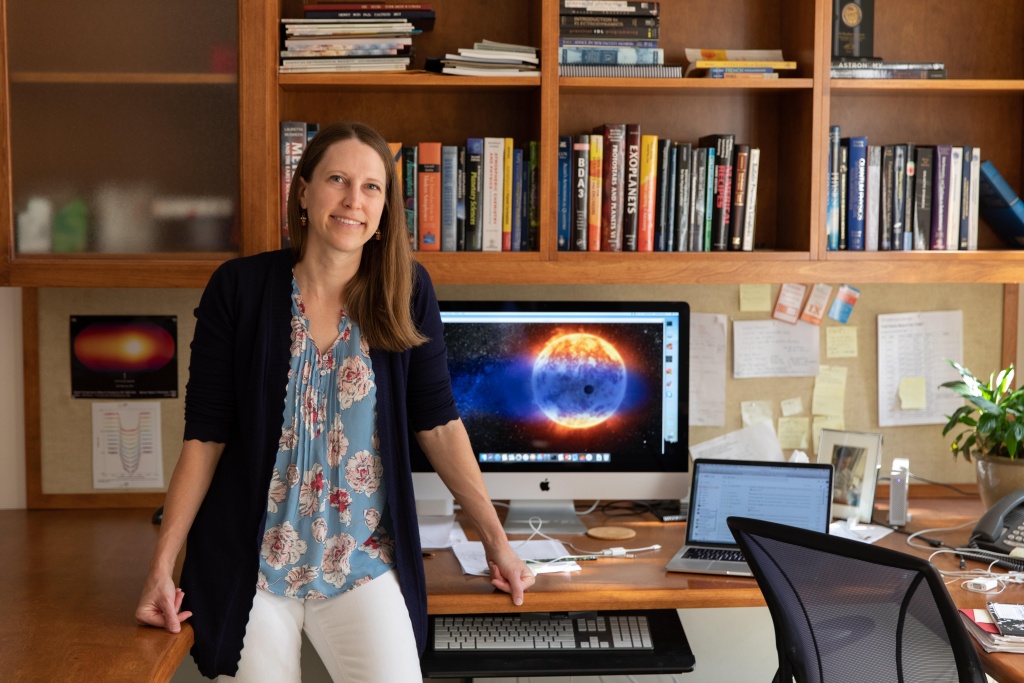EPSC2020: Farinella Prize 2020 Awarded to Jonathan Fortney and Heather Knutson
Prof Jonathan Fortney, an American astrophysicists working at the Department of Astronomy and Astrophysics of the University of California, Santa Cruz, and Prof Heather Knutson, an American astronomer working at the Division of Geological and Planetary Sciences of the California Institute of Technology, have been awarded jointly the 2020 Paolo Farinella Prize for their significant contributions in our understanding of the structure, evolution and atmospheric dynamics of giant planets. The award ceremony will take place today during the EPSC 2020 virtual meeting and will be followed by 15-minute prize lectures by the winners.
The annual prize was established in 2010 to honour the memory of the Italian scientist Paolo Farinella (1953-2000). The award acknowledges an outstanding researcher not older than 47 years (the age of Farinella when he passed away) who has achieved important results in one of Farinella’s fields of work. Each year the Prize focuses on a different research area and in 2020, the tenth edition was devoted to the giant planets: Jupiter, Saturn, Uranus and Neptune but also giant exoplanets.
Prof Fortney’s theoretical work has led to a much better understanding of the atmospheres, interiors, and evolution of giant planets. He has been able to provide theoretical evidence that helium in Saturn’s interior is dramatically concentrated into a helium-rich shell. He has demonstrated that the pattern of enrichment in heavy elements in the Solar System’s giant planets, compared to the Sun, is also a relationship seen in giant exoplanets. He has also developed sophisticated models of giant exoplanet atmospheres to understand their emitted spectra and atmospheric circulation.
Prof Knutson transformed scientists’ approach of observations of exoplanets. In 2007 she discovered day-night temperature contrasts in hot Jupiter HD 189733b, confirming theoretical predictions and launching the field of the observational characterisation of the dynamics of exoplanetary atmospheres. Since then, she led an ambitious observational program with both space-based and ground-based observatories to characterise hot Jupiters and sub-Neptune planets. She also showed that, contrary to common belief at the time, hot Jupiters are not solitary but at least half of them ‘have friends’ – more distant planetary-mass companions orbiting the same star.
Both Prof Knutson and Prof Fortney lead active groups involving young researchers and students. Altogether, their work is providing the basis to better characterise giant planets and understand the formation of planets.
Prof Fortney received his BS in Physics at Iowa State University and his PhD in planetary science at the University of Arizona. He is currently a Professor at the Department of Astronomy & Astrophysics of the University of California in Santa Cruz and the Director of the Other Worlds Laboratory.
Prof Knutson received her BS in Physics at Johns Hopkins University and her PhD in astronomy at Harvard University. She currently holds the position of Professor in the Division of Geological and Planetary Sciences at the California Institute of Technology.
Prof Fortney commented: “I am honored to be selected for the 2020 Farinella Prize. I owe so much to my scientific mentors and collaborators who have helped me along the way. Paolo was an important scientist with a diverse range of interests and it is great to be associated with his contributions to science.”
Prof Knutson said: “I am honored to receive this prize, even if I never had any personal contact with Farinella, and wish that it was possible to accept it in person. On the plus side, the current pandemic has demonstrated just how easy it can be to make new connections with planetary scientists around the world if you’re willing to reach out. I hope that all of us continue to take advantage of these virtual opportunities to build community even after we return to pre-pandemic ways of doing science.”
For 2020, the Farinella Prize also honors the memory of Adam P. Showman, who had accepted to be part of the prize committee, but passed away unexpectedly, leaving an immense body of theoretical work to understand the dynamics of planetary atmospheres.
Tristan Guillot, President of the Farinella Prize Committee, said: “The past decade has seen great advances for our knowledge of giant planets both close to us, like Jupiter and Saturn, and much further for exoplanets. Heather Knutson and Jonathan Fortney have played a major part in those advances. The committee was unanimous in choosing them for the tenth Paolo Farinella Prize. It is also particularly fitting that both collaborated at some point in their career with Adam Showman: Adam was an inspiration for all of us, in particular in the field of the atmospheric dynamics of giant planets, until his untimely passing in February 2020. I’m sure that, as Paolo, he would have been proud of these nominations.”
About the Paolo Farinella Prize
The Paolo Farinella Prize (http://www.europlanet-eu.org/paolo-farinella-prize) was established to honour the memory and the outstanding figure of Paolo Farinella (1953-2000), an extraordinary scientist and person, in recognition of significant contributions given in the fields of interest of Farinella, which span from planetary sciences to space geodesy, fundamental physics, science popularization, and security in space, weapons control and disarmament. The winner of the prize is selected each year on the basis of his/her overall research results in a chosen field, among candidates with international and interdisciplinary collaborations, not older than 47 years, the age of Farinella when he passed away, at the date of 25 March 2000.
The prize was first proposed during the “International Workshop on Paolo Farinella the scientist and the man,” held in Pisa in 2010, supported by the University of Pisa, ISTI/CNR and by IAPS-INAF (Rome).
The “Paolo Farinella Prize” has been awarded:
- In 2011 to William Bottke, for his contribution to the field of “physics and dynamics of small solar system bodies.”
- In 2012 the Prize went to John Chambers, for his contribution to the field of “formation and early evolution of the solar system”.
- In 2013, to Patrick Michel, for his work in the field of “collisional processes in the solar system”.
- In 2014 to David Vokrouhlicky for his contributions to “our understanding of the dynamics and physics of solar system, including how pressure from solar radiation affects the orbits of both asteroids and artificial satellites”.
- In 2015 to Nicolas Biver for his studies of “the molecular and isotopic composition of cometary volatiles by means of submillimeter and millimeter ground and space observations”.
- In 2016 to Dr. Kleomenis Tsiganis for “his studies of the applications of celestial mechanics to the dynamics of planetary systems, including the development of the Nice model”.
- In 2017, to Simone Marchi, for his contributions to “understanding the complex problems related to the impact history and physical evolution of the inner Solar System, including the Moon”.
- In 2018, to Francis Nimmo, for his contributions in our “understanding of the internal structure and evolution of icy bodies in the Solar System and the resulting influence on their surface processes”.
- In 2019, to Scott Sheppard and Chad Trujillo, for their outstanding collaborative work for the “observational characterization of the Kuiper belt and the Neptune-trojan population”.
Images
Prof. Jonathan Fortney, winner of the Farinella Prize 2020. Credit: J. Fortney


Science Contacts
Prof Jonathan Fortney
Department of Astronomy & Astrophysics
University of California, Santa Cruz
1156 High St.
205 CfAO (Center for Adaptive Optics)
Santa Cruz, CA 95064
jfortney@ucsc.edu
Prof Heather Knutson,
California Institute of Technology
Division of Geological & Planetary Sciences
1200 E California Blvd MC 150-21
Pasadena, CA 91125 USA
hknutson@caltech.edu
Media Contacts
Anita Heward
EPSC Press Officer
+44 7756 034243
epsc-press@europlanet-society.org
Livia Giacomini
EPSC Press Officer
epsc-press@europlanet-society.org
Adriana Postiglione
EPSC Press Officer
epsc-press@europlanet-society.org
Notes for Editors
About the Europlanet Science Congress (EPSC) 2020
EPSC (https://www.epsc2020.eu/) will take place as a virtual meeting for the first time in 2020 from 21 September to 9 October. The meeting has a hybrid format of asynchronous presentations and discussion alongside a programme of live webinars.
The Europlanet Science Congress (formerly the European Planetary Science Congress) is the annual meeting place of the Europlanet Society. With a track record of 14 years and regularly attracting around 1000 participants, the Europlanet Science Congress is the largest planetary science meeting in Europe. It covers the entire range of planetary sciences with an extensive mix of talks, workshops and poster sessions while providing a unique space for networking and exchange of experiences.
Follow on Twitter via @europlanetmedia and using the hashtag #EPSC2020
Europlanet
Since 2005, Europlanet (www.europlanet-society.org) has provided Europe’s planetary science community with a platform to exchange ideas and personnel, share research tools, data and facilities, define key science goals for the future, and engage stakeholders, policy makers and European citizens with planetary science.
The Europlanet 2024 Research Infrastructure (RI) has received funding from the European Union’s Horizon 2020 research and innovation programme under grant agreement No 871149 to provide access to state-of-the-art research facilities and a mechanism to coordinate Europe’s planetary science community.
The Europlanet Society promotes the advancement of European planetary science and related fields for the benefit of the community and is open to individual and organisational members. The Europlanet Society is the parent organisation of the European Planetary Science Congress (EPSC).

